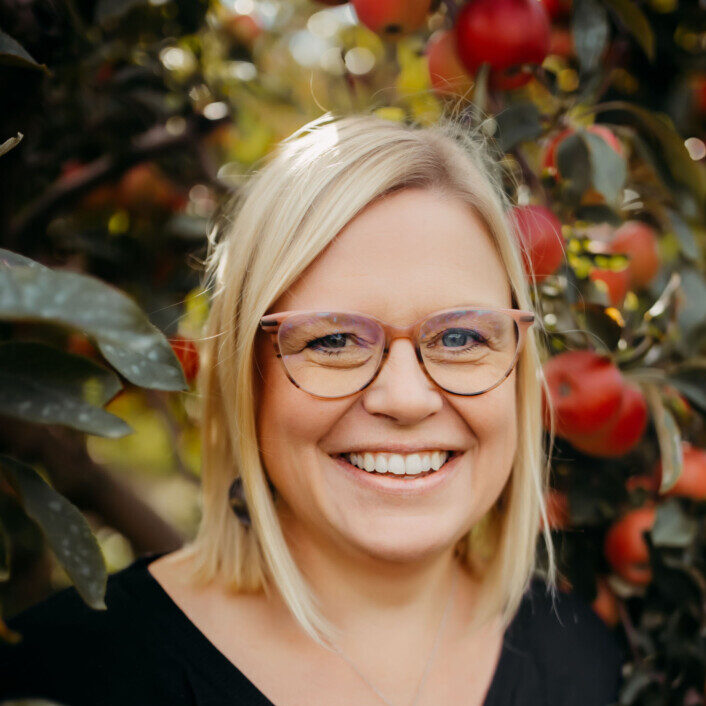My family and I recently went camping on the shores of Lake Michigan. I spent every second I could next to that big, beautiful body of water, making certain I caught every sunset and milking every minute of quiet morning writing time set to the real-life soundtrack of the waves.

The mood of the water changed often. During the week, I admired the lake shining and shimmering in the sun and also dodged raindrops as it became stormy and brooding. I took pictures of still gray waters that merged into the foggy blue horizon, and also tried to capture the power of rolling silver waves that threatened the sandy dunes at its shore. I walked the wet sand, wading through the low fog of morning, and treasured the silhouettes of our kids swimming against the backdrop of the sun disappearing into the horizon, the sky showing off in streaks of brilliant oranges and purples.
On the water’s calmest days, it was easy to keep count of my boys and their gaggle of cousins, but on the days of wild waves, their favorite swimming excursions, we as parents ventured out into the water beside them or sat close by on shore, continually counting heads, and waving them back toward us when the currents took them too far.
I remember learning the Hebrew word for waters is a euphemism for a deep, dark space, like the depths of the sea. Biblical images of water often correlate to chaos. In the beginning, the water was wild and uncontrollable, but the Spirit was hovering there. God brings order and beauty; God’s presence tames the chaos.
Maybe this is part of why as much as I love the water, I respect it, too. I have, and have tried to instill in my children, a healthy fear. I know the lake’s power, its danger. Like the water that blends into the horizon, this can be a thin line — deep respect that doesn’t cross over into terror or avoidance. We enter the waters cognizant of potential currents, humble enough to ask for help when we need it, and with an awareness of our limits, when it might be time to head toward shore to catch our breaths.

As a writer, a reader, a teacher, a literary citizen, I feel much the same way about words and language. I never tire of admiring them — the way twenty-six letters can be arranged to create words, sentences, paragraphs, chapters, and novels. Words, spoken in stories or conversation, recorded in books or passed down from generation to generation, have power. Like water, language is essential and it is powerful.
But, like the water that blends into the horizon, I worry that sometimes the admission of the power of language and literature crosses the line from respect to irrational fear. And, as a friend of mine once told me, when we give into irrational fear, we give that fear more power. We get stiff in the water so we can’t float.
As an educator, I know firsthand of the battles being fought in our communities and our schools over books, over words. Last week, the community I grew up in rejected a library millage, the news story garnering national attention. It seems the one idea that people on all sides of this issue can agree on is the power of the books, the potential of literature and stories to have impact. I’d also argue their ability to grow empathy, wisdom, and perspective beyond one’s own experiences.
I also notice panic — whether it happens in the water or in a library — is catching; it spreads easily to those nearby. And I am learning, very slowly, and sometimes begrudgingly, what it looks like to lean into fear, both my own and that of those around me, by seeking understanding. I wonder how fear might dissipate with a bit more listening and asking more questions. I’ve never had my mind changed by a church or yard sign, but coming to understand the experiences of actual people has done the trick. Nadia Bolz Weber writes, “Maybe the opposite of fear isn’t bravery, maybe the opposite of fear is love.”

As my summer vacation comes to an end and I prepare for another school year, I want to hold that image of the lake close. I want to hold onto that overwhelming feeling of standing in its immenseness, its power, the sense it gives that the world and God are larger and much more powerful than we are. The reminder that it’s often those things with potential for power — words and water — that cause a blurred line between respect and terror. And I want to remember that God’s Spirit hovers close, making beauty out of the chaos, and driving out fear, not with certainty or rightness, but with perfect love.

